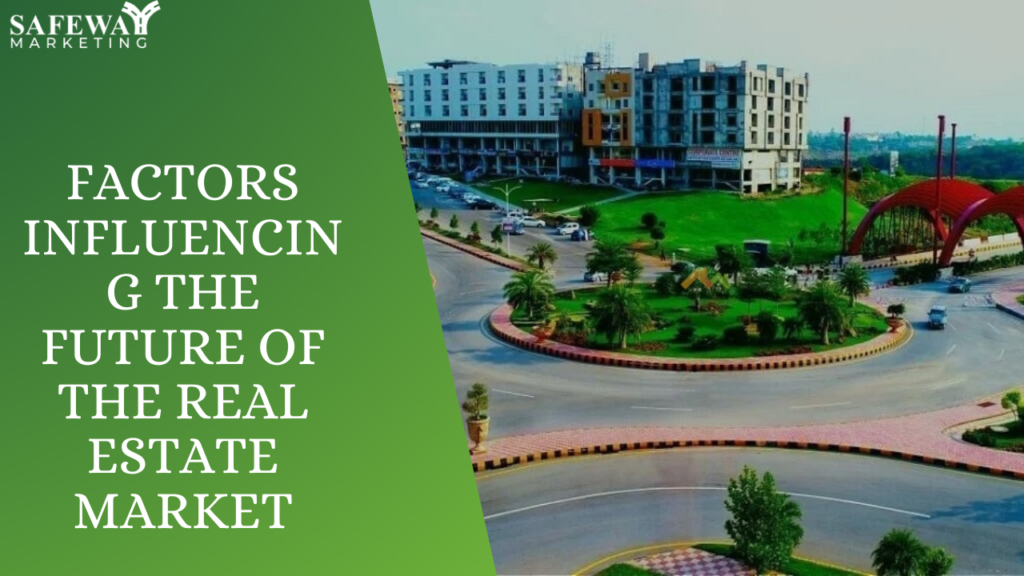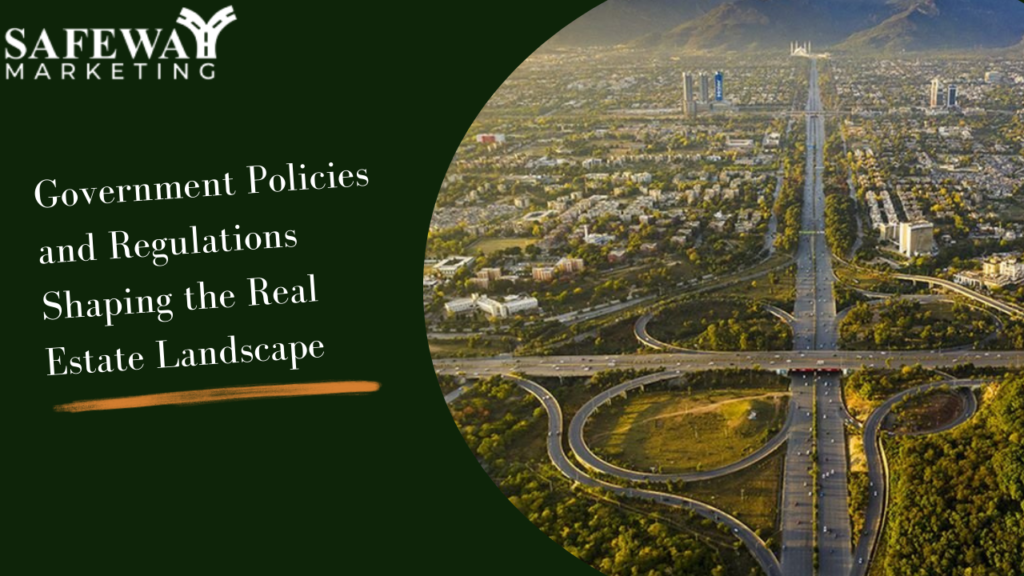The real estate market in Islamabad, Pakistan has witnessed significant growth and development in recent years. As the capital city of Pakistan, Islamabad offers a unique blend of modern infrastructure, serene surroundings, and a booming economy, making it an attractive destination for real estate investment.
This article explores the current state of the real estate market in Islamabad, identifies the key factors influencing its future, examines the impact of technology on the sector, forecasts trends and predictions, discusses government policies and regulations, highlights investment opportunities and challenges, and concludes with insights into the path ahead for Islamabad’s real estate market.
1. Introduction: Real Estate Market in Islamabad, Pakistan
Welcome to the dazzling world of Islamabad’s real estate market! Situated in the picturesque capital of Pakistan, this city boasts a thriving and dynamic real estate sector. From the prime properties adorned with breathtaking views to the bustling commercial hubs, Islamabad’s real estate market has something for everyone.
The real estate sector plays a vital role in Islamabad’s economy, contributing significantly to its growth and development. With a growing population and an increasing demand for housing and commercial spaces, the market has become a hotbed for investors and buyers alike. So, whether you’re looking to invest, rent, or purchase your dream property, Islamabad has plenty to offer.

2. Current Trends and Dynamics of the Real Estate Market
In recent years, Islamabad has witnessed a surge in demand for residential properties. The city’s serene environment, coupled with its modern amenities, has attracted people from all walks of life. From luxurious apartments to spacious villas, the real estate market has witnessed a boom in residential developments.
On the commercial front, Islamabad is experiencing rapid growth. With multinational corporations setting up their offices and retail outlets, the demand for commercial spaces has skyrocketed. The city’s expanding business landscape has led to the emergence of new commercial hubs, which has further fueled the real estate market’s growth.
In terms of architectural trends, modern and innovative designs are becoming increasingly popular. From sustainable architecture to smart homes, developers are incorporating new concepts to meet the evolving demands of buyers. With a focus on aesthetics and functionality, Islamabad’s real estate market is witnessing an exciting shift in design trends.

3. Factors Influencing the Future of the Real Estate Market
Several factors are poised to shape the future of Islamabad’s real estate market. Firstly, the city’s population is expected to grow rapidly, driven by urbanization and the influx of people from other areas. This population growth will create a surge in demand for housing and commercial spaces, presenting lucrative opportunities for investors and developers.
Secondly, economic development and the availability of job opportunities will play a significant role in driving the real estate market. As Islamabad continues to attract businesses and investment, the demand for office spaces and residential properties will continue to rise. The city’s stable economic environment and promising employment prospects make it an enticing destination for real estate investments.
Lastly, the development of infrastructure and transportation will greatly impact the real estate market in Islamabad. The ongoing construction of highways, metro lines, and other transportation projects will enhance connectivity within the city and attract investors to previously untapped areas. As accessibility improves, property values in these areas are likely to rise, offering great investment potential.

4. Technological Advancements and their Impact on the Real Estate Sector
The real estate sector in Islamabad is not immune to the wave of technological advancements sweeping across industries. One notable impact is the adoption of digital platforms for property transactions. Buyers and sellers can now conveniently browse listings, schedule viewings, and even finalize deals online. This streamlines the process and makes it more accessible to a wider audience.
Virtual reality technology has also made its way into the real estate market. Potential buyers can now take virtual tours of properties, allowing them to explore every nook and cranny without leaving their homes. This technology provides an immersive experience and helps buyers make more informed decisions.
Another technological trend revolutionizing the real estate sector is smart home technology. From automated lighting and security systems to smart appliances, these features are not only convenient but also have the potential to increase property values. As smart homes become more prevalent, buyers are increasingly looking for properties with these modern amenities.
So, whether you’re a seasoned investor or a first-time homebuyer, the future of Islamabad’s real estate market promises excitement, growth, and countless opportunities. With its beautiful landscapes, economic stability, and technological advancements, the real estate sector in Islamabad is set to soar to new heights. Get ready to embark on a thrilling journey into the future of property in this vibrant city.

5. Forecasting and Predictions for the Future of the Real Estate Market
The real estate market in Islamabad, Pakistan, is poised for growth and exciting developments in the coming years. Here are some key projections and predictions for the future:
Projected growth rate of property prices:
With increasing urbanization and a growing population, property prices in Islamabad are expected to continue their upward trend. Experts predict a steady annual growth rate of around 7-10% in the next few years.
Expected changes in supply and demand dynamics:
As the demand for residential and commercial spaces continues to rise, developers are focusing on expanding the supply. This is likely to lead to a balanced market with healthy demand and ample supply, giving buyers and investors more options to choose from.
Anticipated areas of development and expansion:
The city’s outskirts and peripheral areas are expected to witness significant development and expansion. Improved infrastructure, such as transportation networks and connectivity, will open up new investment opportunities in these areas.

6. Government Policies and Regulations Shaping the Real Estate Landscape
The government of Pakistan has introduced several policies and regulations to shape the real estate landscape in Islamabad. Here are some notable factors:
Impact of tax reforms on property investments:
Recent tax reforms aim to eliminate tax evasion and bring transparency to the real estate sector. These reforms may initially create some challenges for investors, but they will ultimately contribute to a more stable and secure market.
Regulatory measures to control property speculation:
The government has implemented measures to discourage speculative investments in the real estate market. These measures include higher taxes on short-term property transactions and stricter regulations on property flipping.
Incentives and initiatives for real estate development:
The government is actively promoting real estate development through incentives and initiatives. These include providing tax exemptions for developers, offering subsidies for affordable housing projects, and streamlining the approval process for construction permits.

7. Investment Opportunities and Challenges in the Future
Investing in Islamabad’s real estate market offers numerous opportunities, but it also comes with its share of challenges. Here’s what you need to know:
Promising sectors for real estate investments:
The residential sector, particularly in gated communities and high-end housing schemes, presents lucrative investment opportunities. Commercial real estate, such as office spaces and retail outlets in prime locations, also holds great potential.
Risks and challenges associated with property investments:
Like any market, the real estate sector in Islamabad carries certain risks. These include market fluctuations, economic instability, and regulatory changes. It’s crucial for investors to stay informed and conduct thorough due diligence before making any investment decisions.
Strategies for successful real estate investments:
To succeed in Islamabad’s real estate market, it’s important to adopt a long-term investment approach. Diversifying your portfolio, conducting thorough market research, and seeking expert advice can help mitigate risks and maximize returns.

Conclusion: The Path Ahead for Islamabad’s Real Estate Market
In conclusion, the future of the real estate market in Islamabad, Pakistan appears promising. With a growing population, expanding economy, and government initiatives to promote real estate development, there are ample investment opportunities to be explored. However, challenges such as regulatory changes and market fluctuations need to be navigated carefully. Embracing technological advancements and staying updated with market trends will be crucial for success in this dynamic sector. As Islamabad continues to evolve, stakeholders in the real estate industry can look forward to a bright and prosperous future.
FAQ
1. What are the current trends in the real estate market in Islamabad?
The current trends in Islamabad’s real estate market include a rising demand for residential properties, a growing commercial real estate sector, and emerging trends in architecture and design. These trends reflect the evolving needs and preferences of buyers and investors in the city.
2. How do government policies and regulations affect the real estate market in Islamabad?
Government policies and regulations play a significant role in shaping the real estate landscape in Islamabad. Tax reforms, regulatory measures to control property speculation, and incentives for real estate development can all impact property investments and market dynamics. It is important for stakeholders to stay informed about these policies to make informed decisions.
3. What investment opportunities are available in Islamabad’s real estate market?
Islamabad’s real estate market offers various investment opportunities. Promising sectors include residential properties, commercial ventures, and developments in areas undergoing infrastructure expansion. However, it is essential to carefully assess risks and challenges associated with each opportunity and develop strategies for successful investments.
4. How can technology impact the future of the real estate market in Islamabad?
Technology has the potential to significantly impact the future of Islamabad’s real estate market. The adoption of digital platforms for property transactions, the use of virtual reality in property showcasing, and the incorporation of smart home technology can enhance customer experiences, streamline processes, and influence property values. Embracing these technological advancements can provide a competitive edge in the market.


